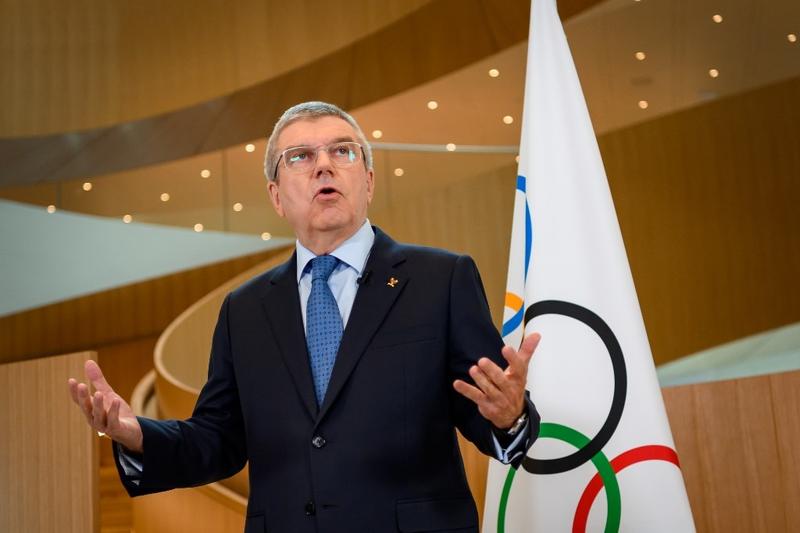 In this photo taken on March 3, 2020 International Olympic Committee (IOC) President Thomas Bach delivers a statement on the COVID-19 situation during a meeting of the executive board at the IOC headquarters in Lausanne, Switzerland. (FABRICE COFFRINI / AFP)
In this photo taken on March 3, 2020 International Olympic Committee (IOC) President Thomas Bach delivers a statement on the COVID-19 situation during a meeting of the executive board at the IOC headquarters in Lausanne, Switzerland. (FABRICE COFFRINI / AFP)
NEW YORK — The International Olympic Committee is considering various scenarios for the Tokyo Games amid the coronavirus pandemic but cancellation is not one of them, IOC President Thomas Bach has told the New York Times.
Organizers of the world’s biggest multi-sports event have repeatedly said the Games would start on July 24 as scheduled, even as the rapid spread of the flu-like virus has brought sporting events around the globe to a standstill.
The coronavirus has killed more than 10,000 people worldwide sparking fears that the Olympics might be postponed or canceled.
The cancellation is not on the agenda. We are committed to the success of these Games
Thomas Bach, President, IOC
ALSO READ: Too early to decide fate of Tokyo 2020, says IOC president
Bach, however, said the IOC was not even considering scrapping the Games.
“The cancellation is not on the agenda. We are committed to the success of these Games,” he said.
An IOC task force, which included the World Health Organization, had determined it was too early to make a decision on how to manage the impact from the pandemic on the Olympics.
“We don’t know what the situation will be,” he said.
“Of course we are considering different scenarios, but we are contrary to many other sports organizations or professional leagues in that we are four and a half months away from the Games.
“What makes this crisis so unique and so difficult to overcome is the uncertainty. Nobody today can tell you what the developments are tomorrow, what they are in one month, not to mention in more than four months.”
Japan is expected to welcome 600,000 overseas spectators and athletes to the event, which has seen sponsors pump in billions of dollars and at least US$12 billion spent on preparations.
Bach said the final decision on the Games would not be determined by financial interests. Protecting the health of everyone involved and containing the virus were the main objectives, he added.
“Thanks to our risk management policies that have been in place for four years and our insurance, the IOC in any case will be able to continue operations and continue to accomplish our mission,” he said.
“The 206 national Olympic committees and the international sports federations expressed that the world in this extremely difficult and concerning situation needs a symbol of hope.
“So for us, while not knowing how long this tunnel will be, we would like the Olympic flame to be a light at the end of the tunnel ...”
READ MORE: IOC to discuss virus impact with Olympics stakeholders
In recent days several athletes, including reigning Olympic pole vault champion Katerina Stefanidi, accused the IOC of putting athletes’ health at risk by urging them to continue to train while many countries are in lockdown mode.
Bach, a former Olympic gold medalist in fencing, said he sympathized with the athletes.
“For an athlete, the worst thing for preparation is the uncertainty that distracts from training and preparations,” he said. “I told the 220 athletes in the phone call Wednesday that we cannot pretend we have answers to all your questions.
“We are in the same situation as you and the rest of the world. It is a unique exceptional situation, which requires exceptional solutions.”


